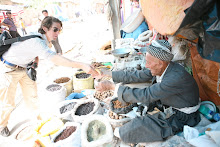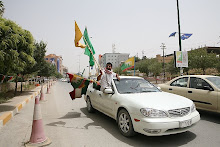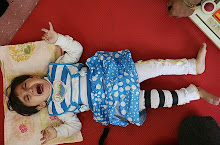Glistening with pride the young boy pulled 2 shiny Kalashnikov bullets out of his pocket. Holding them aloft he announced with absolute certainty that with these two he would single handedly free Libya, bring down Colonel Ghadaffi, and right the wrongs of the last 40 years. He was serious.
The young boy in question, Mohammed, is merely 15 years old and has come from Manchester. He is one of many people from Libyan families who have flocked here as part of this “glorious revolution” despite never have lived here. His mother packed him a tiny bag some weeks ago and sent him on his way, then told his school that he was going to Spain.
He announced very bravely that he had come to fight and possibly to die, and that he would do anything for his country and his people, and I have no doubt that at first he meant it. But very quickly it became clear that he no longer believes this. His romantic ideas have been replaced by fear, and despite his brave rhetoric he soon admitted that he just wants to go home, see his friends and talk to girls. Having seen the wounded in hospital, including a boy his own age, and having lived with the sporadic gunfire, he has quickly decided this is no place for him.
Mohammed is not alone. There are countless other people here who have come to help, from Canada, America and Australia. One man from Chicago handed the keys to his car shop over to his friend before leaving to join the fight. When I last spoke to him he was now looking for ways out. The majority of these Libyan expats were born here, but there are also a number of second-generation exiles; born abroad, raised abroad and educated abroad. As they sit around the lobbies of hotels and in free apartments most of them soon discover that there is neither a weapon for them to use nor even a role, and that they have become mere voyeurs at the edge of a chaotic rag tag movement – a movement that has stalled.
In the early days of the revolution, for those who wanted to fight there was always room. Ghadaffi’s arsenals had been looted and anyone who could get their hands on a gun could head to the front. A couple of Libyan expats died early on in the shelling and others were wounded while bringing supplies to the soldiers, but now that rebels are trying to impose a stricter order to this chaos, there is little for them to do, and slowly they are now heading home.
Technically nobody is supposed to fight without having gone to one of the training camps but many locals continue to do so. The expats will not. Locals who looted guns had also looted uniforms and now they often stroll to the front line smoking pot, hop into a pickup truck and charge forward screaming ‘god is great’, only to come pelting back soon after encountering incoming fire. The confusion at the front is palpable, and this is one of the reasons the rebels can make no headway. I doubt however that attending training camps will change this, for the system leaves much to be desired.
I have spent some time observing the training and watched it in bemusement. As people sit around being taught how to fire rocket-propelled grenades, mortars and other weapons, many of them play on their mobile phones. Others are out of earshot of the instructors, and I saw some who simply walked away from their groups. As they attempted to drill I could not resist a smile, such was the haphazard nature. This is a direct legacy of Ghadaffi’s paranoia though for he was terrified of coups.
For those who have travelled from abroad there are even fewer defined roles, and talking to many of the foreigners here it appears that they have started to realise this. Although they came with great intentions it is now slowly dawning on them that having rushed over there is nothing for them to do.
Some have become translators and some fixers - but many others just seem to wait around. They came here to fight but can no longer do so, or in some cases no longer have the stomach to. One Libyan man born in England, who came with us to the front spent the day hunched down in the back seat of our car, terrified, even before fighting had begun. He’s very keen however to have a picture of him holding an RPG, and will no doubt return to his commnity a hero. For him as with others, the Libya that he had grew up dreaming is a far cry from the reality on the ground, and further still from the life to which he had become accustomed in Britain.
Herein lies the greatest irony though. All of the expats identify themselves as Libyans first, though they may never have lived here. Second generation emigrants in particular seem to feel more Libyan than western, and now face a crisis of identity. They have grown up thinking of their adopted countries as a foreign land, and yet can no longer feel at home back here either. It remains to be seen how many will move back when or if Ghadaffi falls.
I have encountered a number of conspiracy theories regarding the evil west, as is typical throughout the middle east, but not as many as I had expected given that this country has been virtually cut off for 40 years. Many claim that Europe is afraid of a free, united, oil rich and Islamic Libya on their doorstep, hence the stalling – and in this case they may not be wrong.
It must be said that Libyans who have lived under the fearful Ghadaffi regime show much more gratitude towards the west’s involvement than some of their compatriots from abroad– at least for the moment. While being understandably suspicious of the West, having lived for decades under a propaganda machine and having seen Western leaders prop him up, they are still grateful for the support. How long this sentiment will last however is unknown, and what is certain is that if this revolution does not pan out the way they hoped, it will again be the West that they blame. When NATO accidently bombs rebel tanks, this makes things much worse.














































